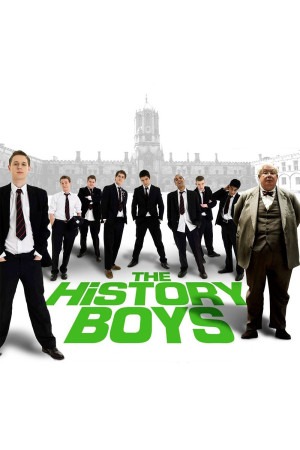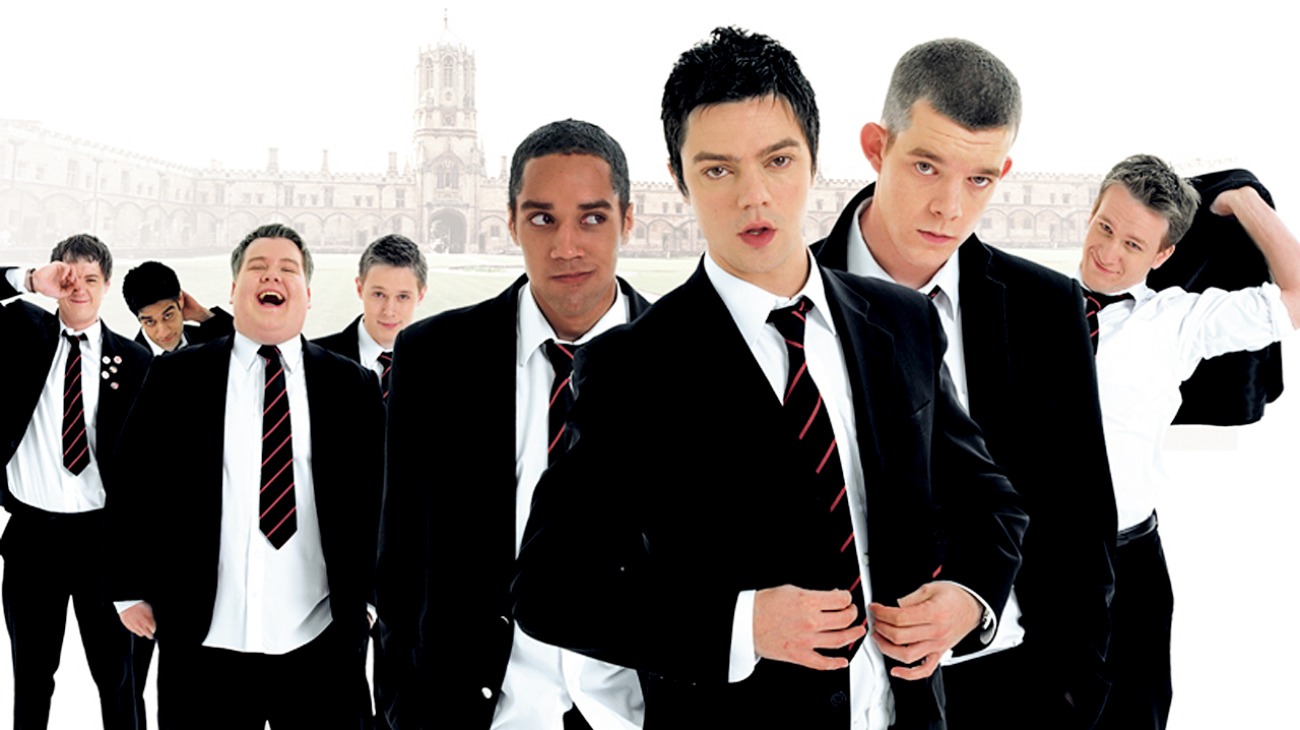
A movie for people who love the Tonys
The British, they do know how to romp. That's all The History Boys is, really: a romp, a frolic, just a bit of fun to fill the time between here and there. There's a healthy bit about growing up, and adolescent sexuality, and a great huge pile about the changing face of teaching, but it's all much less profound than e.g. a spot on the National Board of Review Top 10 would have you believe it is.
Happily the film, and the filmmakers, are not particularly fussy over the movie, and so it fails entirely to live down the standard for Inspirational Teacher Pictures. I suppose this is partially because the Inspirational Teacher is a bit more erratic than beloved, and also because he gropes his male students. But I get ahead of myself.
Based on the Six! Time! Tony! Award! Winning! Play! by Alex Bennett, The History Boys is the story of Hector (Richard Griffiths), an aging teacher of "general studies" at a middling boys' grammar school in one of the less classy parts of England, during the receding half of the New Wave era in 1983. Hector is a believer in a sort of "kitchen sink" theory of pedagogy, guiding his students in the study of poetry, classic movies, 1930s show tunes, and above all the French subjonctif - the tense of "might have been." Into Hector's cozy little fiefdom comes Mr. Irwin (Stephen Campbell Moore), a ruthlessly efficient young man whose approach to teaching the school's eight best and brightest how to game the system for their university applications is to be scandalous and interesting, without giving the slightest damn whether or not they're right. Who will reign supreme in this mighty battle: the forces of Knowledge For Its Own Sake, or Knowledge To Impress People?
Nope, sorry, you're thinking of an American film. Bennett's script is not concerned in the least with "right" or "wrong" or in any way judging the characters. They're all flawed, even the eight boys, and not one of them is in any sense a villain. Even when the actual mechanics of a plot begin to happen (it's more of a situational piece, really), as Hector is revealed to be a serial groper of his legally adult students - the audience has known this since the beginning - there's nothing at all like censure; indeed the reedy headmaster who uses this as the wedge to drive the teacher out of the school is just about the only person who we don't like, and only then because he finds Hector's teaching out of step with the modern world, not because he's a sexual prude. (That all looks like a spoiler: it's really not).
I suppose it's my respect for the film's egalitarian goodness that leads me to declare it a charming, worthy bit of a thing even though in my heart of hearts I know it's pretty disposable. That and the iron-clad fact that British stage actors are the most wonderful people in the whole world. There's not much "there" there, it just a standard coming-of-age-with-a-wonderful-teacher story, kind of like Dead Poets Society without the shrill Robin Williams performance. Although originality, I think, is overrated.
Nicholas Hytner isn't much of a film director (hi, The Object of My Affection), but he does open up The History Boys rather successfully: I honestly tended to forget that it was ever a stage play, even though fully 80% of the scenes take place in one of three stuffed schoolrooms. There's a constant, unintrusive score of New Wave hits and not so much hits, underlying everything that doesn't remind the audience of the film's setting so much as it keeps everything energetic and fast-moving. If I have a complaint, it's with the bizarre over-reliance on hand-held cameras running the grainiest damn film you've ever seen in daylight, but other than that it's a very nimbly-executed film that doesn't try to hard to be much of anything: none of the scenes that could easily fall into High Dramatic Camp are filmed in any style other than the brisk, uninflected tones of the rest of the film. It's very pragmatic. Can I say that, or is that too vague? Well, it's my blog: the cinematography here is brilliantly pragmatic.
Saved the best for last: the amazing cast. Good God. Richard Griffiths, almost undoubtedly best known in this country for playing Harry Potter's venal Uncle Vernon, is one of those fantastic British character actors who is in damn near everything, and it's only when you start to look at his C.V. and start realising "wow, he was in that?" that you come to appreciate his full quality. This film is no exception to that (it's a Tony! Winning! Performance! after all), other than that he is in an entire picture rather than three minutes of it, which tends to make it easier to bask in his amazing stagey goodness. The rest of the cast is entirely more obscure, which perhaps make their performances seem better than they actually are; I'm going to be generous and assume that's not the case, and give the appropriate love especially to Frances de la Tour as the dour history teacher, and Samuel Barnett as the student of most anxious sexual confusion and sturdiest character arc (only the British could stuff a film this full of men, young and old, who have no idea whether their sexual desire for men makes them homosexual). I suppose I could defend these statements, but it's that whole, y'know, British thing. It's entirely possible that some people do not agree with me on the point that British stage actors are inherently & objectively good, and it's not small relief that I am not in the least bit required to engage with such heretical nonsense.
7/10
Happily the film, and the filmmakers, are not particularly fussy over the movie, and so it fails entirely to live down the standard for Inspirational Teacher Pictures. I suppose this is partially because the Inspirational Teacher is a bit more erratic than beloved, and also because he gropes his male students. But I get ahead of myself.
Based on the Six! Time! Tony! Award! Winning! Play! by Alex Bennett, The History Boys is the story of Hector (Richard Griffiths), an aging teacher of "general studies" at a middling boys' grammar school in one of the less classy parts of England, during the receding half of the New Wave era in 1983. Hector is a believer in a sort of "kitchen sink" theory of pedagogy, guiding his students in the study of poetry, classic movies, 1930s show tunes, and above all the French subjonctif - the tense of "might have been." Into Hector's cozy little fiefdom comes Mr. Irwin (Stephen Campbell Moore), a ruthlessly efficient young man whose approach to teaching the school's eight best and brightest how to game the system for their university applications is to be scandalous and interesting, without giving the slightest damn whether or not they're right. Who will reign supreme in this mighty battle: the forces of Knowledge For Its Own Sake, or Knowledge To Impress People?
Nope, sorry, you're thinking of an American film. Bennett's script is not concerned in the least with "right" or "wrong" or in any way judging the characters. They're all flawed, even the eight boys, and not one of them is in any sense a villain. Even when the actual mechanics of a plot begin to happen (it's more of a situational piece, really), as Hector is revealed to be a serial groper of his legally adult students - the audience has known this since the beginning - there's nothing at all like censure; indeed the reedy headmaster who uses this as the wedge to drive the teacher out of the school is just about the only person who we don't like, and only then because he finds Hector's teaching out of step with the modern world, not because he's a sexual prude. (That all looks like a spoiler: it's really not).
I suppose it's my respect for the film's egalitarian goodness that leads me to declare it a charming, worthy bit of a thing even though in my heart of hearts I know it's pretty disposable. That and the iron-clad fact that British stage actors are the most wonderful people in the whole world. There's not much "there" there, it just a standard coming-of-age-with-a-wonderful-teacher story, kind of like Dead Poets Society without the shrill Robin Williams performance. Although originality, I think, is overrated.
Nicholas Hytner isn't much of a film director (hi, The Object of My Affection), but he does open up The History Boys rather successfully: I honestly tended to forget that it was ever a stage play, even though fully 80% of the scenes take place in one of three stuffed schoolrooms. There's a constant, unintrusive score of New Wave hits and not so much hits, underlying everything that doesn't remind the audience of the film's setting so much as it keeps everything energetic and fast-moving. If I have a complaint, it's with the bizarre over-reliance on hand-held cameras running the grainiest damn film you've ever seen in daylight, but other than that it's a very nimbly-executed film that doesn't try to hard to be much of anything: none of the scenes that could easily fall into High Dramatic Camp are filmed in any style other than the brisk, uninflected tones of the rest of the film. It's very pragmatic. Can I say that, or is that too vague? Well, it's my blog: the cinematography here is brilliantly pragmatic.
Saved the best for last: the amazing cast. Good God. Richard Griffiths, almost undoubtedly best known in this country for playing Harry Potter's venal Uncle Vernon, is one of those fantastic British character actors who is in damn near everything, and it's only when you start to look at his C.V. and start realising "wow, he was in that?" that you come to appreciate his full quality. This film is no exception to that (it's a Tony! Winning! Performance! after all), other than that he is in an entire picture rather than three minutes of it, which tends to make it easier to bask in his amazing stagey goodness. The rest of the cast is entirely more obscure, which perhaps make their performances seem better than they actually are; I'm going to be generous and assume that's not the case, and give the appropriate love especially to Frances de la Tour as the dour history teacher, and Samuel Barnett as the student of most anxious sexual confusion and sturdiest character arc (only the British could stuff a film this full of men, young and old, who have no idea whether their sexual desire for men makes them homosexual). I suppose I could defend these statements, but it's that whole, y'know, British thing. It's entirely possible that some people do not agree with me on the point that British stage actors are inherently & objectively good, and it's not small relief that I am not in the least bit required to engage with such heretical nonsense.
7/10






